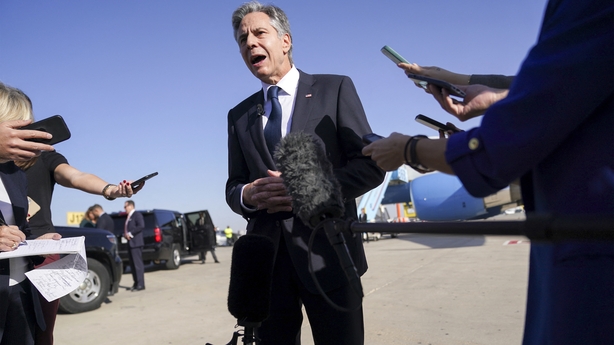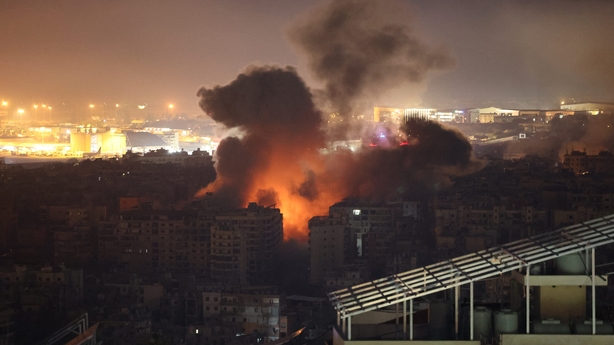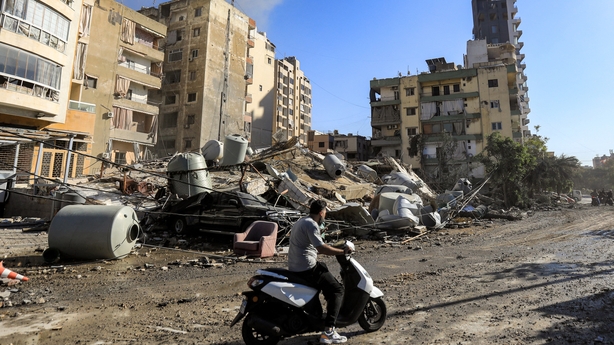Hezbollah has confirmed that Israel killed Hashem Safieddine, the apparent successor of its slain leader Hassan Nasrallah, in a strike, without saying when or where it happened.
"We mourn... the head of the executive council of Hezbollah, his eminence the scholar Sayyed Hashem Safieddine," the Iran-backed group said in a statement, adding that was killed by "a criminal and aggressive Zionist raid" alongside other Hezbollah fighters.
The deeply religious Safieddine, a cleric with family ties to Nasrallah, had been widely viewed as the most likely candidate for the party's top job after the assassination of Nasrallah.
Safieddine, a member of the group's governing Shura Council, had strong ties to Iran after undergoing religious studies in the Islamic republic's holy city of Qom.
The United States and Saudi Arabia had put him on their respective lists of designated "terrorists" in 2017.
Last night, Israel's army said it had killed Safieddine in an airstrike on Beiruit threes ago.
"It can now be confirmed that in an attack approximately three weeks ago, Hashem Safieddine, the head of Hezbollah's Executive Council, and Ali Hussein Hazima, the head of Hezbollah's Intelligence Directorate, were killed along with other Hezbollah commanders," the Israeli army said in a statement.
The army said the air force had hit Hezbollah's main intelligence headquarters in the southern Beirut suburb of Dahiyeh, Hezbollah's stronghold in the Lebanese capital, and that more than 25 Hezbollah militants were present at the time.
Long-time Hezbollah leader Nasrallah was killed on 27 September in an Israeli air strike on Beirut's southern suburbs.
Safieddine, tipped to succeed his distant cousin as leader of the Lebanon-based group, had been out of contact since Israeli strikes on Beirut weeks ago, a high-level Hezbollah source said at the time.
'Now time to end Gaza conflict' - Blinken
Earlier, US Secretary of State Antony Blinken said "now is the time" to end the conflict in Gaza, and urged Israel to avoid further escalation with Iran.
Israel is fighting Iran-backed Hamas in Gaza and Hezbollah in Lebanon and has pledged to hit back against Iran's 1 October missile strike.
In Lebanon, the Israeli military issued a new evacuation call for the south Lebanese city of Tyre on Wednesday, warning of impending operations targeting Hezbollah.
The warning sparked a new exodus from the once vibrant city, which is perched on the Mediterranean coast.

"The situation is very bad, we're evacuating people," said Mortada Mhanna, who heads Tyre's disaster management unit.
"You could say that the entire city of Tyre is being evacuated," said Bilal Kashmar, the unit's media officer.
Separately, Israel's national security council called on Israelis to immediately leave some tourist areas in southern Sri Lanka over the threat of a possible terrorist attack.
The agency said the warning pertained to the area of Arugam Bay and beaches in the south and west of Sri Lanka, and stemmed from "current information about a terrorist threat focused on tourist areas and beaches".
Mr Blinken's visit to the region is his 11th since the start of the war in Gaza and his first since Israel-Hezbollah violence escalated to all-out war late last month.
The war in Gaza began with Hamas's 7 October 2023 attack on Israel, which resulted in the deaths of 1,206 people, mostly civilians, according to an AFP tally of Israeli official figures.
Israel's retaliatory offensive has killed 42,718 people in Gaza, also mostly civilians, according to figures from the territory's health ministry which the UN considers reliable.
"Since October 7 a year ago, Israel has achieved most of its strategic objectives when it comes to Gaza... Now is the time to turn those successes into enduring, strategic success," Mr Blinken said as he departed Israel, following meetings with Prime Minister Benjamin Netanyahu and other top officials.
On aid to Gaza, Mr Blinken said he saw "progress being made, which is good, but more progress needs to be made and, most critically, it needs to be sustained".
Of Israel's pledge to retaliate for Iran's 1 October missile attack, the US top diplomat said: "It's also very important that Israel respond in ways that do not create greater escalation."
After Israel, Mr Blinken will visit Saudi Arabia, which has put on hold talks towards a normalisation deal with Israel until a Palestinian state is created.
The US diplomat urged Israel to seize what he described as an "incredible opportunity" to move towards a deal with Saudi Arabia.
Previous US efforts to end the Gaza war and contain the regional fallout have failed, as did a bid spearheaded by President Joe Biden and his French counterpart Emmanuel Macron to secure a temporary ceasefire in Lebanon.

In his meeting with Mr Netanyahu yesterday, Antony Blinken urged his ally to seize on the killing of Hamas leader Yahya Sinwar in Gaza to work towards a ceasefire.
Sinwar was the architect of the 7 October 2023 attack that triggered the Gaza war.
Hailing his killing, Mr Netanyahu said it did not mean the war was over, though he added that it could be the beginning of the end.
The militants also took 251 hostages back into Gaza. Ninety-seven are still being held there, including 34 the Israeli military has said are dead.

During his meeting with the Israeli premier in Jerusalem, Mr Blinken "underscored the need to capitalise" on the death of Sinwar, US State Department spokesman Matthew Miller said.
This would be done by "securing the release of all hostages and ending the conflict in Gaza in a way that provides lasting security for Israelis and Palestinians alike", he added.
Benjamin Netanyahu told Mr Blinken that Sinwar's death "could have a positive impact on the return of the hostages", according to a statement from the prime minister's office.
Mr Blinken also pressed for more aid to be allowed into besieged Gaza as concerns rise for tens of thousands of civilians trapped by fighting in the hard-to-reach north.
Israel launched a major air and ground assault in northern Gaza this month, vowing to stop Hamas militants from regrouping in the area.
The only medical facility still partially functioning in the targeted area has "no medicine or medical supplies", warned Kamal Adwan Hospital director Hossam Abu Safia.
"People are being killed in the streets, and we can't help them. Bodies are lying on the streets."
In Lebanon, the Israeli military warned people in parts of Tyre to move out of the areas ahead of operations targeting Hezbollah militants.
Lebanon's official National News Agency meanwhile reported "intense enemy strikes" on several parts of Tyre district.
Hezbollah kept up its attacks on Israel, saying it had fired rockets at an Israeli military intelligence base in the suburbs of commercial hub Tel Aviv.
After nearly a year of war with Hamas in Gaza, Israel shifted its focus to Lebanon in late September, vowing to secure its northern border under fire from Hezbollah.
Israel ramped up its air strikes on what it claims are "Hezbollah strongholds" around the country and sent in ground troops late last month, in a war that has killed at least 1,552 people since 23 September, according to an AFP tally of Lebanese health ministry figures.

